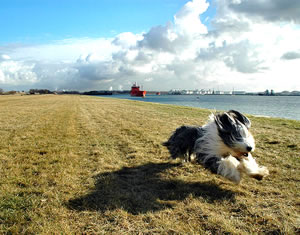ENTHUSIASM

Enthusiastic Self-Image
Your self-image has a major impact on your character and personality. The way you view yourself becomes your reality, for better or for worse. This concept is so powerful that it will make a difference in all that you do, and do not do, for your entire lifespan.
View yourself as a person who is enthusiastic. Even if you are not always enthusiastic, as long as you are enthusiastic sometimes or have been enthusiastic in the past, it means that you are a person who has experienced enthusiasm. And since you know you have already been enthusiastic, it means that you can view yourself as someone who will be enthusiastic more often in the future.
Every time you are enthusiastic, you strengthen your view of yourself as being someone who is enthusiastic. So the very next time you experience enthusiasm about something positive, you can say to yourself, “I’m enthusiastic now, and I am an enthusiastic person.” As you identify with your positive qualities, you make them an integral part of who you are. Of course, we need to live in reality and not think that we have more of a quality (whether positive or otherwise) than we actually do. But part of that reality is knowing that we have the seed of positive qualities that we can nurture and help grow.
“But I’m not always enthusiastic,” it’s easy to argue. True, you might not always be enthusiastic. But with many factors in our self-concept, we view ourselves as being a certain way even though we are not always that way. From the negative perspective, a bank robber is someone who robbed even one bank. A hijacker becomes one even if he only hijacked one car.
Apply this pattern to positive actions. One act of kindness means that you are a kind person. Viewing yourself this way will motivate you to be consistently kinder. One act of courage means that you have courage. You are more likely to act courageously from then on. And a single instance of enthusiasm entitles you to a self-image of someone who has the attribute of enthusiasm. Now you can be more enthusiastic more often. This itself is something to be enthusiastic about.
“As a child I used to view myself as someone who was lazy,” a highly accomplished middle-aged man related. “As I was growing up, I developed diligent work habits. As an adult I spent many hours in constructive activities and worked more hours than most people. But I used to say to myself, ‘Not bad for someone who is lazy.’ Then one day I realized that I didn’t have to consider myself lazy anymore. It hit me how strong the power of a limiting self-image can be. For years I hadn’t really had to view myself as lazy.”
Hearing this helped me with enthusiasm. Our self-image is actually our choice. I used to view myself as someone who isn’t really enthusiastic, but has been once in a while. I decided that I have been enthusiastic enough times to add this to my self-image. Ever since I view myself as an enthusiastic person, I find it easier to be enthusiastic.
* * *
Fascination
Develop the quality of being fascinated. You are fascinated when you are extremely interested. In this state, your attention is totally attuned to the subject or object of your fascination. There is an aspect of enthusiasm in fascination. People who frequently experience fascination are enthusiastic.
We all find some things fascinating that others might consider boring. And others find some things fascinating that we might find boring. A person who is aware of the wonders of the Creator’s creation will experience fascination daily.
Parents who find young children fascinating have a much easier time taking care of them. Teachers who find the learning process fascinating enjoy teaching. Being fascinated with your studies or with what you do to earn a livelihood adds a valuable dimension. People who are fascinated with knowledge and wisdom continue learning their entire lives.
Learn to be fascinated with things that you take for granted. Moving your hands, for example. Notice how you lift them. Notice how you can move them forwards or backwards. You can do this slowly or quickly. Notice how you pick things up and how you turn door handles. At the next opportunity, spend fifteen minutes being fascinated with your hands. You might find this so enjoyable that you will want to repeat this a number of times.
People who are fascinated with understanding other people non-judgmentally constantly learn from the reactions of others. We have a lot to learn about even the people we feel we know well. And there are so many different people to learn from and about. Since we all have to interact with other people, gaining this knowledge has many practical benefits. You can help other people more effectively. You will get along better with others. Professionally you will be more successful…
* * *
Enthusiasm Exercises
- List the moments in your life where you exhibited the greatest enthusiasm.
- List people you’ve met who are filled with enthusiasm, and who can serve as your “enthusiasm role models.”
As you read your list, don’t view those experiences from the outside as if they were happening in the past. Rather, view them as if you were experiencing them once again right now. Relive your greatest moments as if they were happening now. Be there the same way that you were when they originally occurred. Be patient about this. It’s an inner mental process. By calmly practicing, you will eventually experience it the right way and [be able to access this state of intensity, and draw upon its positive energy].
More Exercises:
- List the things you would like to do, if you had more enthusiasm.
- Create a list of people who you imagine “cheering” for you, when you accomplish and achieve. Use that to motivate you to act with greater enthusiasm.
~~~~~~~~~~~~~~~~~~~~
Excerpted with permission from “ENTHUSIASM!” Published by ArtScroll/Mesorah Publications Ltd., Brooklyn, NY - https://www.artscroll.com
by Rabbi Zelig Pliskin
Posted in: Personal Growth



